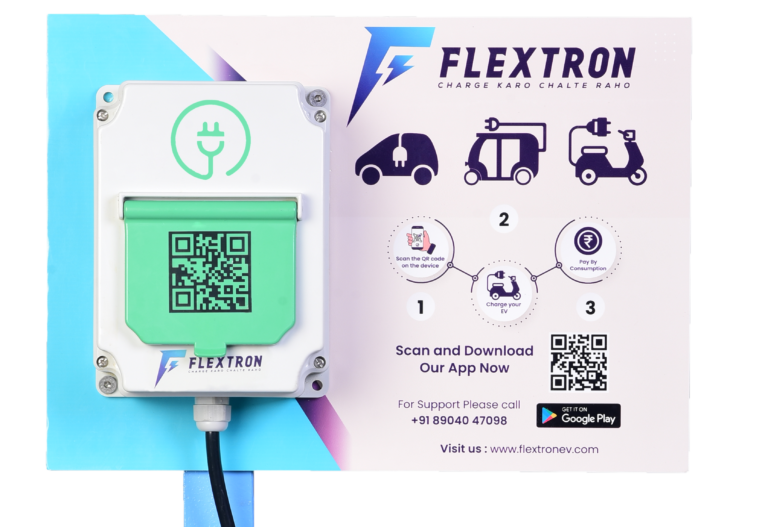Electric vehicles (EVs) are powered by electricity instead of gasoline or diesel. To recharge the battery of an EV, you use an AC charger.
This charger connects to a standard power outlet and provides the electricity needed to fill up the EV’s battery.
What is an AC EV Charger?
An AC EV charger, or Alternating Current Electric Vehicle Charger, is a device that supplies electric power to an EV from the grid using alternating current (AC).
The charger supplies power to the vehicle, which then converts it into a form that can be stored in the battery. AC chargers are commonly used at home or in public charging stations for everyday use.
How Does an AC EV Charger Work?
Electric vehicles (EVs) rely on AC EV chargers to recharge their batteries efficiently. Here’s a step-by-step explanation of how these charger’s work:
1. Connecting the Charger
To begin charging, you plug the EV into the AC charger, which is connected to a standard electrical outlet or a dedicated charging station. This connection establishes the flow of electricity from the grid to your vehicle.

2. Power Delivery
The AC charger transfers alternating current (AC) power from the electrical grid into the vehicle’s charging system. This is the type of power commonly used in homes and public charging points.
3. Onboard Conversion
Inside the EV, there is an onboard charger that takes the incoming AC power and converts it into direct current (DC). This conversion happens within the vehicle itself because the battery requires DC power to store and use energy effectively.
4. Battery Charging
The converted DC power is then sent to the EV’s battery. The battery stores this energy, which will later power the vehicle’s electric motor and other electrical systems.
5. Charging Completion
Once the battery reaches its full capacity, the onboard charger automatically stops the charging process. This prevents overcharging, which can damage the battery and reduce its lifespan.
Benefits of AC EV Chargers
1. Cost-Effective
AC EV chargers are generally less expensive compared to DC chargers, making them a budget-friendly option for home and public charging.
2.Ease of Installation
Level 1 chargers require minimal installation, typically just plugging into a standard outlet. Level 2 chargers are straightforward but might need some electrical upgrades.
3.Sufficient for Daily Use
For most users, Level 2 AC chargers provide adequate charging speed to meet daily driving needs, especially if the vehicle is parked overnight or during work hours.
4.Widespread Availability
AC chargers are commonly available in homes, public charging stations, and commercial properties, making them accessible for regular use.
5.Energy Efficiency
AC chargers are efficient for everyday charging and help maintain the battery health over time.
Types of AC EV Chargers
1. Level 1 Charger

Voltage: 120V
Charging Speed: Adds 2-5 miles of range per hour. Suitable for overnight or extended parking.
Use Case: Ideal for home use where slow charging is acceptable.
Visit: Flextron AC Charger to know more about Level 1 Charger
2.Level 2 Charger

Voltage: 240V
Charging Speed: Adds 10-60 miles of range per hour, depending on the charger and vehicle.
Use Case: Commonly used in homes, public charging stations, and commercial locations for faster charging. Requires professional installation.
Visit: Flextron AC Chargers to know more about Level 2 Charger
How to Choose the Right AC EV Charger
Selecting the right AC EV charger for your needs involves considering several factors to ensure you get a charger that fits your lifestyle and vehicle requirements. Here’s a step-by-step guide to help you make the best choice:
1. Assess Your Charging Needs
Daily Driving Distance: Evaluate your typical daily driving distance. If you drive long distances regularly, you might need a faster Level 2 charger to ensure you have enough charge.
Charging Time: Determine how much time you have available for charging. Level 1 chargers are slower and may be suitable if you can leave your car plugged in for extended periods. Level 2 chargers offer faster charging and are ideal for quicker top ups.
2. Check Vehicle Compatibility
Connector Type: Ensure the charger’s connector matches your vehicle’s charging port. Most EVs use the J1772 connector for Level 1 and Level 2 AC charging but verify compatibility for your specific vehicle.
Charging Capacity: Match the charger’s power output with your vehicle’s maximum charging rate to optimize charging speed.
3. Consider Installation Requirements
Electrical System: Assess if your home or business electrical system can handle the charger’s power requirements, especially for Level 2 chargers.
Professional Installation: Level 2 chargers typically require professional installation. Verify if you need an electrician and consider any additional electrical upgrades.
4. Evaluate Features
Smart Charging: Look for features such as WiFi or Bluetooth connectivity that allow you to monitor and control charging via a mobile app.
Safety Features: Ensure the charger includes safety features like overcurrent protection, temperature monitoring, and automatic shutoff.
Weather Resistance: For outdoor installations, select a charger with appropriate weather resistance ratings.
5. Compare Costs
Charger Cost: Compare prices of different chargers based on features and power output. Level 1 chargers are usually cheaper, while Level 2 chargers cost more but offer faster charging.
Installation Cost: Factor in the cost of installation, which can vary based on the complexity of the setup and any necessary electrical upgrades.
6. Read Reviews and Ratings
Customer Feedback: Check reviews and ratings from other users to gauge the reliability and performance of the charger.
Expert Recommendations: Seek advice from EV forums, dealerships, or industry experts for recommendations on the best chargers for your specific needs.
Conclusion
AC EV chargers are an essential component of the electric vehicle ecosystem, providing an efficient and cost-effective way to keep your EV powered. By understanding the different types and benefits of
With AC chargers, you can make an informed decision about which charger best suits your needs and contributes to a more sustainable future. Whether for home use or public charging stations, AC EV chargers play a crucial role in supporting the growing adoption of electric vehicles.
Choosing the right AC EV charger involves evaluating your charging needs, understanding charger types, ensuring compatibility with your vehicle, considering installation requirements, and comparing costs and features.
By following these steps, you can select an AC EV charger that best fits your requirements and contributes to a more efficient and convenient electric vehicle ownership experience.




